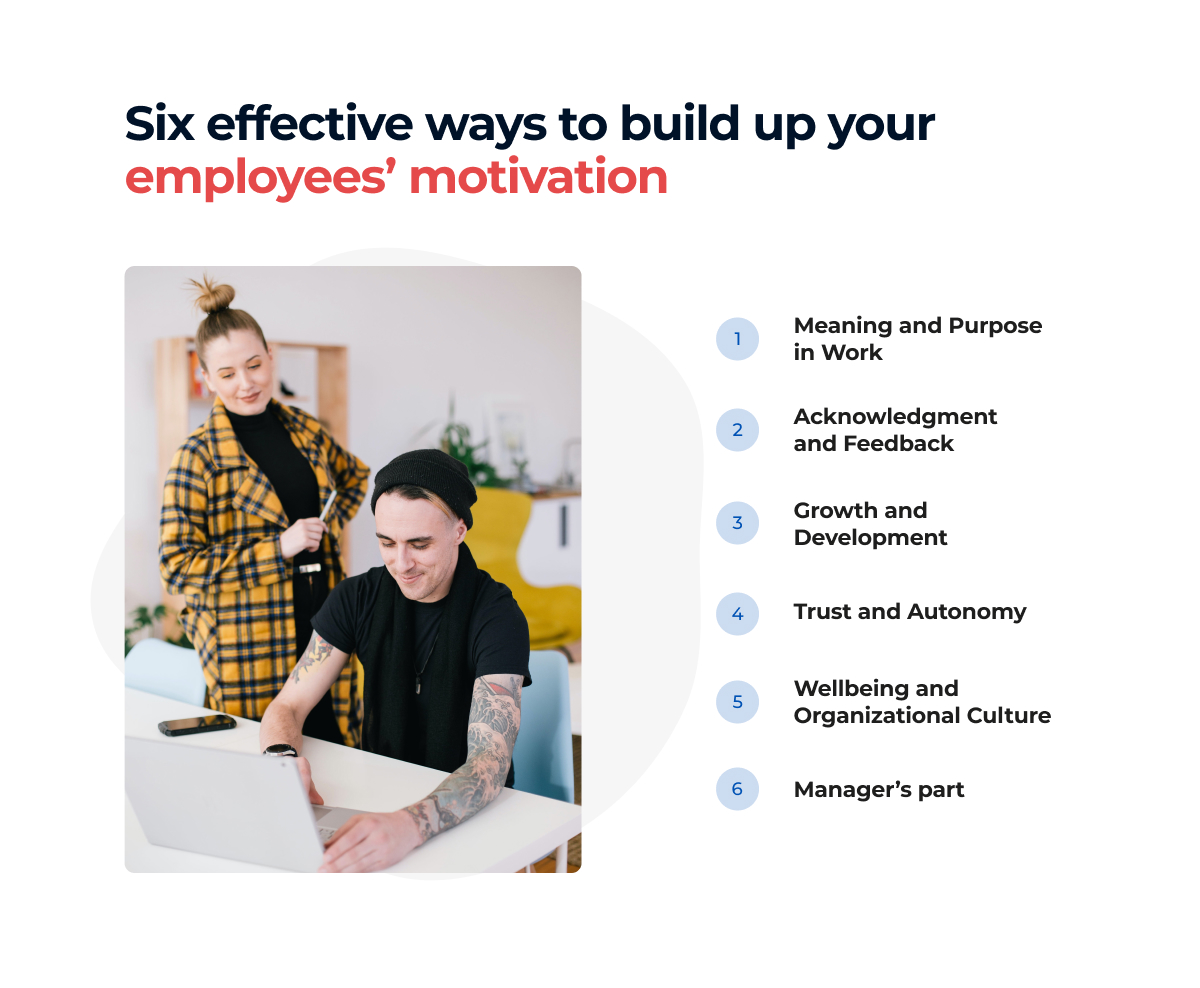What motivates people to work? The first thing that springs to mind is “money” but is it really so? Well, not exactly. Studies have shown that financial gain is neither a primary nor a sustainable employee driver in the long run. Fair compensation turns out to be just a sub-motivator that, rather quickly, loses its appeal and is taken for granted.
So, what are the truly effective ways to motivate employees nowadays? How to keep your staff engaged, taking into consideration market changes and the new employee mindset focused on the search for professional fulfillment. It’s pretty straightforward that the stick and the carrot approach does not stand a chance when up against the Great Reshuffle way of thinking. It’s high time to introduce some thorough changes regarding employee acknowledgment.
The actual reasons for motivation loss are frequently more complex than having a lousy manager. Low engagement is closely tied to a deficiency of wellbeing at the workplace. Lack of recognition, no sense of agency, poor development perspectives, and micromanagement are the most recurring causes of demotivation. Hence, if you’re aiming at keeping your team committed and engaged, bear in mind that there is more to work than bonuses and KPIs. Invest in employees’ wellbeing and you will soon be reaping the fruits of effectiveness.
As in everything, finding a happy medium is the key. Motivational issues are not very likely to be solved solely with financial gain. Content driven from the one-off bonus fades away pretty fast, leaving an employee with the same old unresolved issues. Through balancing perks and benefits with an encouraging working culture, any organization is able to create an employee-friendly environment. We won’t counsel you on how to manage your financial incentive system to keep your team happy, as it is not our field of expertise. Yet, we can provide you with some practical hints on how to create motivating working conditions.
Six effective ways to build up your employees’ motivation
If you’re still breaking your head over the subject of employee engagement, read on to find some applicable solutions for your conundrum. We’ve rounded up six issues worth reflecting on.

Meaning and purpose in work
Idealistic as it may seem, people genuinely need to see a purpose in their work to drive their motivation. How else would they get up every day to do the job, meet KPIs and engage in their following tasks? We need a clear intrinsic motivation to convince ourselves that the work is worth undertaking. Extrinsic motivators, such as salary or any other external factors that may push you towards action might not be strong enough in the long term. According to studies quoted by Harvard Business Review: “9 in 10 of us would be willing to earn less money for the opportunity to do more meaningful work”. In other words, we’re ready to accept a lower salary to experience the value of purposeful work. Professional development is a good example of purposeful aspirations for some, for others, it will be seeing how their work reflects in the company’s results.
Acknowledgment and feedback
Recognition is a significant factor supporting our motivation. We feel more secure and self-confident when our work gets acknowledged. The necessity of support and constructive evaluation has grown substantially after we have switched to a remote way of working. Recognizing your employees in an individual, tailor-made way creates an opportunity for building a meaningful, personal connection that will resonate. To make it happen, management should pay close attention to the performance review process. According to Gallup: “Frequency of feedback is key to engaging remote workers”. Regular evaluation sessions can be easily scheduled via an LMS so that you won’t have to worry about setting the dates for the following meetings. To complement the ongoing feedback direction, we would also suggest an agile approach to setting and measuring goals. Last but not least, while giving feedback, relate to employee achievements, not only areas for improvement.

Growth and development
Opportunity for development is one of the most appreciated values a company can offer to its employees. It is essential to hire an effecient operations manager since as a manager encourage your subordinates’ growth during regular performance reviews.. Discuss their career path and set challenging but achievable learning goals. An LMS might be handy here, as it enables you to create learning tracks and gives insight into the progress made by each learner. Investments made in up-skilling will soon come back in the form of employee engagement. What’s more, an open-handed approach to learning facilitates the organizational culture, which is vital for a stimulating and favorable work environment.
Trust and autonomy
There are not many stronger triggers for motivation than the sense of trust between employees and the manager. It allows your staff members to spread their wings and compels them to deliver the best results. Trust enables employee operational independence and does not require constant micromanagement until the work is completed. Together with accountability over the assigned task, one gains control and autonomy in action, which reinforces an individual’s intrinsic motivation. It might be a truly empowering experience enabling the employee to thrive.
Wellbeing and organizational culture
Focus on career wellbeing is a trend gaining popularity these days, worth taking a closer look at when considering employee motivation drivers. The mechanism is simple: if you like what you do, your work is more rewarding and you do it more willingly. That’s what companies should be aiming at to prevent burnout and ensure the long-standing cooperation with specialists they want to keep. Following Gallup’s study: “Globally, employee engagement and wellbeing remain very low, and it’s holding back enormous growth potential. (…) Only 20% of employees strongly agree that they like what they do every day”. It might be difficult to persuade someone to start liking their job, though creating an inclusive organizational culture based on ethical business practices, trust, respect, and appreciation might help a lot. In fact, burnout affects about 70% of employees.
Manager’s part
The last position on the list boils down to a human factor. The manager, being the facilitator of a healthy working environment, becomes the key figure and person accountable for the employees’ level of motivation. Based on Gallup’s data, up to 70% of employee engagement is determined by the manager alone. That’s a great deal of responsibility, though nurturing your team’s motivation should not be a challenge, not unless you take account of our guidelines. Engage with your employees, do it in a mindful way. Listen to what they have to say and inquire about their aspirations. Thanks to two-way communication, you will get a chance to create the right working environment for genuine engagement.
Beneficial effects of motivation
Considering the quoted research, improving employee engagement and building up motivation should be treated as one of the main KPIs for managers and HR departments. Wellbeing at work was given a lower priority for long enough. Surprisingly, it was not recognized as the ground for higher productivity or means of improving retention levels. The impact of motivation reinforcement is enormous and perfectly tangible, counts in: lower absence, higher productivity levels, achieved targets, or the number of introduced optimizations. Prioritize your motivational system, and keep your qualified specialists in your team. The news will spread fast and soon it will be your company that attracts better job seekers with inspiring working conditions.










